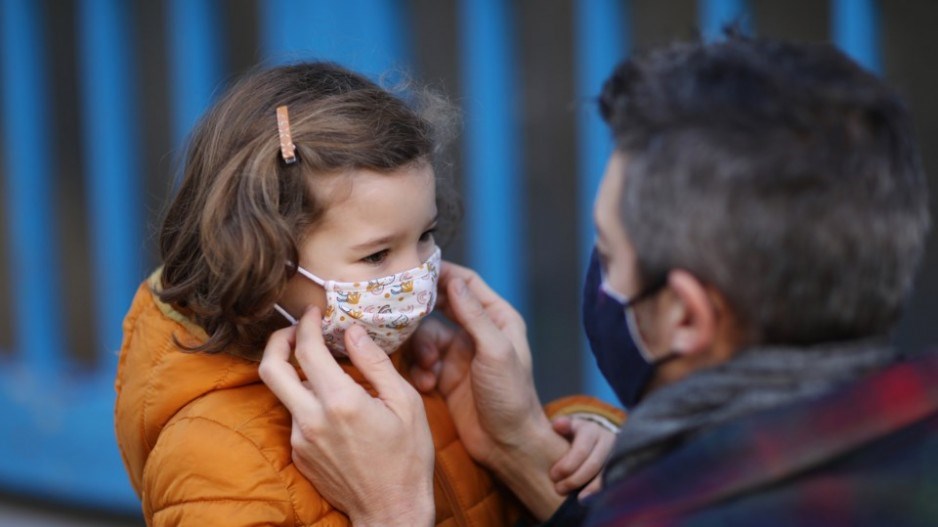B.C. government data for new COVID-19 infections shows that unvaccinated people are getting infected with the disease in near proportion to their share of the general population – a significant change from a month ago.
The flip of that is that fully vaccinated people are getting infected in near proportion with their share of the general population – although they are showing more resistance to serious illness.
Between December 23 and December 29, the approximately 19.8% of B.C.'s population that was not fully vaccinated accounted for 16% of new cases, according to government data. In contrast, between November 24 and 30, unvaccinated people accounted for 57.9% of new COVID-19 infections in the province despite representing less than 21% of B.C.'s total population at the time.
A similar infection rate in unvaccinated people (16.5%) was accounted for between December 29 and January 4.
The late-December data came at a time when testing centres were overwhelmed, and provincial health officer Bonnie Henry told vaccinated people with mild symptoms to isolate and not get tested so that the tests could be used for people who were vulnerable for serious illness.
It is unclear whether how that new procedure for getting tested might have impacted the data.
One possibility is that the new Omicron variant that was gaining traction across the province at the time is better able to evade vaccinations and infect vaccinated people.
Fully vaccinated people continue to show more resistance to serious illness. People who were not fully vaccinated between December 16 and December 29 accounted for 55% of hospitalizations in that time period. That is far in excess of their share of the population.
Rampant spread of COVID-19 has continued in B.C. into January.
There were 3,223 new infections diagnosed in the past 24 hours, raising the number of people actively fighting infections in B.C. to a record 31,817. Of those 324 are in hospitals, while 90 of those in hospital are in intensive care units (ICUs).
Another three people died from COVID-19 in the past 24 hours, raising the province's pandemic death toll to 2,430.
Of the 273,731 people in B.C. known to have contracted COVID-19 since the first case was detected in January 2020, 238,524 or 87.1%, are considered by the government to have recovered. In most cases, that recovery status is determined when patients go 10 days after first exhibiting symptoms. Many people deemed recovered, however, continue to suffer long-term health problems.
There are 4,406,651 B.C. residents who have had at least one dose of vaccine, while 4,140,207, or 94% of those, are considered fully vaccinated with two doses.
The B.C. government estimates that 88.4% of eligible British Columbians, older than five years, have had at least one vaccine shot, while 83.1% of that eligible population is fully vaccinated with two jabs.
The B.C. government last year estimated that the province's total population is 5,147,712, so Glacier Media's calculation is that 85.6% of B.C.'s total population has had at least one dose of vaccine, and 80.4% of the province's total population has had two doses.
B.C. has been increasing access to third doses of vaccine, and health workers have officially put 1,042,480 booster doses in arms, although Health Minister Adrian Dix earlier today tweeted that 1,042,861 British Columbians have received third, or booster, doses. Regardless of which of those figures is correct, it translates into a record number of booster doses – more than 44,000 – being administered in the past 24 hours.
B.C. has ramped up the number of booster dose shots provided in recent days, and part of the reason for this is a large clinic set up at the Vancouver Convention Centre, where there was an hours-long line-up in the freezing rain earlier today.
Older British Columbians have shown to be more vulnerable to serious infections, and deaths, so it is a worrying development that there has been a sudden spike of 16 new active outbreaks in health-care facilities, including seniors' care homes and retirement communities in the past day. In total, B.C. has 37 active outbreaks in health-care facilities.
Those new health-care facility outbreaks include:
• Eagle Ridge Hospital in Port Moody;
• Royal Columbian Hospital in New Westminster;
• George Derby Centre in Burnaby;
• White Rock Seniors' Village;
• CareLife Fleetwood in Surrey;
• Evergreen Baptist Centre in White Rock;
• Hilton Villa Seniors Community in Surrey;
• Kinsmen Lodge in Surrey;
• Kiwanis Care Centre in New Westminster;
• St. Vincent's Langara in Vancouver;
• Aberdeen Hospital in Victoria;
• Eden Gardens in Nanaimo;
• Glenwarren Lodge in Victoria;
• Kiwanis Village Lodge in Nanaimo;
• Selkirk Seniors Village in Victoria; and
• Clover Point Care in Victoria. •




